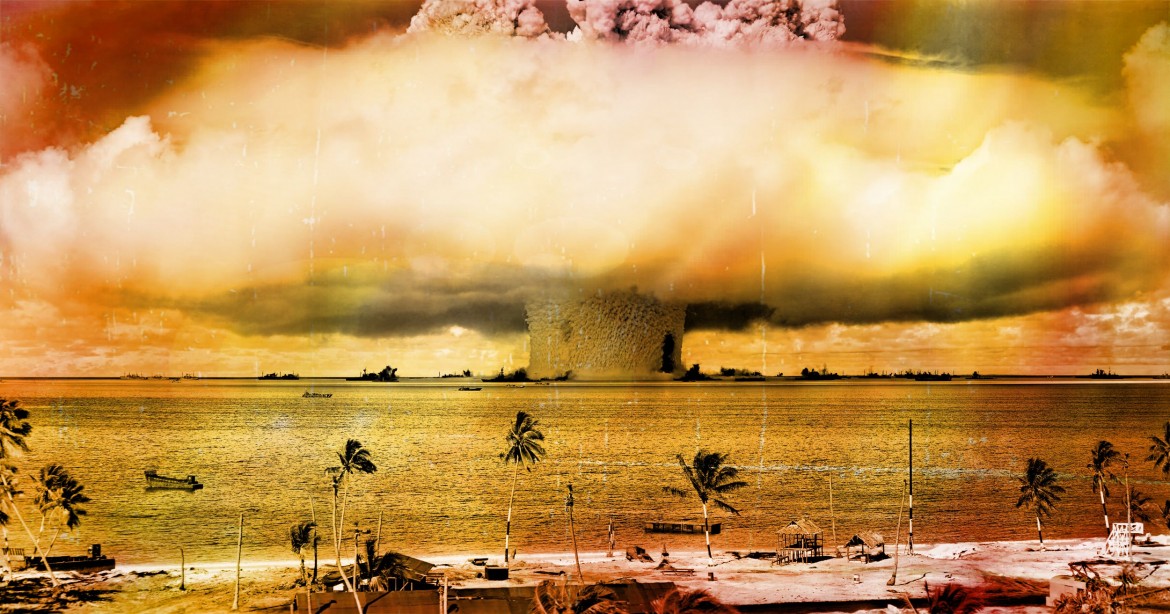Interview
Most Italians want a nuclear ban. Will the new government sign on?
We spoke with three Nobel Peace Prize winners about the prospect of a global nuclear weapons ban treaty. ‘If Italy were to take this step, it would be significant.’

“We hope to reach the stage of the global ratification of the treaty banning nuclear weapons by 2020, and we are confident that Italy will do its part,” says Susi Snyder, a nuclear disarmament manager by profession, the leader of the PAX No Nukes project and coordinator of the Don’t Bank on the Bomb campaign.
While not downplaying the risk of a new escalation, she is tentatively optimistic. We met her in a bar in Borgo Pio, together with the British researcher Elisabeth Minor and Francesco Vignarca of Rete Disarmo, all of them members of the board of ICAN, which received the Nobel Peace Prize in 2017 for starting the process of the signing of this new treaty. They are in Rome for a conference at the Vatican. It’s an opportunity to take stock of the current situation and the “risk of nuclear extinction” that we are still facing.
We would do well to remember that ignoring climate issues is not the only thing that can lead to the destruction of life on Earth—and that the global architecture for mutual checks between the two great powers of the Cold War has been progressively dismantled, as a result of the handiwork of Trump’s now-former national security adviser, John Bolton. Now, there is little left of the precariously balanced structure built up to avoid Dr. Strangelove’s “End of the World” button being pushed, except for the last remaining piece: the New Start Treaty, which expires in 2021.
As the trend turns toward new large-scale investments in the modernization of the old arsenals, the Budget Commission of the US Congress has estimated that $77 billion will be required over several years to modernize the warheads, mostly dating from the ‘50s and ‘60s, and make them able to communicate with satellite systems and F-35 stealth fighters.
The latest report by the Stockholm International Peace Research Institute (SIPRI) estimates that there are nearly 14,000 nuclear weapons in existence in nine countries (including 3,700 which are deployed and operational), able to destroy life on the planet many times over, while four of the nuclear powers—China, Pakistan and India (both currently in a high-tension situation over Kashmir), Israel and North Korea—have never become part of the anti-proliferation controls imposed by the treaties. However, in a world where the main risks to populations are coming from cyber-attacks, biological weapons or killer robots, is abolishing nuclear weapons still the main focus when fighting for peace?
“Nuclear deterrence doesn’t work anymore,” Snyder tells us. “It should be eliminated. Deterrence means that if you kill me, I kill you too, but under certain rules. What the nuclear option introduces is the prospect of an indiscriminate attack on civilians, a logic which is even more unacceptable now, and whose protagonists are states. Back then, it involved a very close link with the political structure in an age that was more bipolar, as one could see by the presence of the red telephone line between the Kremlin and the White House. The new types of weapons have different types of uses, and we must move past the very concept of deterrence.”
Is it realistic to think that the TPNW treaty will be ratified, after the US pulled out of the INF treaty banning medium-range missiles and with the current threat of war with Iran?
Snyder: In the ‘80s as well, there were investments of billions of dollars in both the US and in the USSR for nuclear war, but international pressure stopped that arms race. And when Bolton said he wanted to shelve multilateralism by denouncing the INF treaty and the agreement with Iran, major industry players such as Boeing, Lockheed Martin and Raytheon had already pocketed contracts worth hundreds of billion dollars by the end of 2018. But even without the INF treaty, for example, Italy has said it will not accept any more missiles. And this has major implications, because when there is a risky investment, finance tends to pull out. The arms producing industries make profits only on the first contract, due to the announcement effect which sends their share prices up, so they need constant announcements of new contracts and an atmosphere of constant threat. Today, Japanese banks have already started to withdraw from such investments.
Where is the ratification process at the moment?
Minor: Today, we have the signatures of 79 countries. and 32 of the 50 full ratifications that are needed. We have made progress. But even before ratification, the new treaty could provide access to a rules-based framework to help people who have suffered due to bombings and nuclear tests. Making a soft entrance into this network may be of interest to Japan, but also to Australia, and during the last few months Kazakhstan and the Republic of Kiribati have already joined. If Italy were to also take this step, it would be a significant one.
Is there any ongoing dialogue with the new yellow-red government?
Vignarca: We have sent Italian MPs a letter of support for the UN nuclear weapons ban, noting that during the last legislature Luigi Di Maio had also expressed his support, and that the polls show that 70% of Italians want it to be ratified. Two days ago, 14 M5S senators gave us a positive answer, including the chairman of the Senate Foreign Relations Committee, Vito Petrocelli, the head of the M5S group, Gianluca Ferrara, and the vice president of the Defense Committee, Daniela Donno.
Originally published at https://ilmanifesto.it/un-trattato-contro-latomica-che-aiuti-chi-lha-subita/ on 2019-09-29
